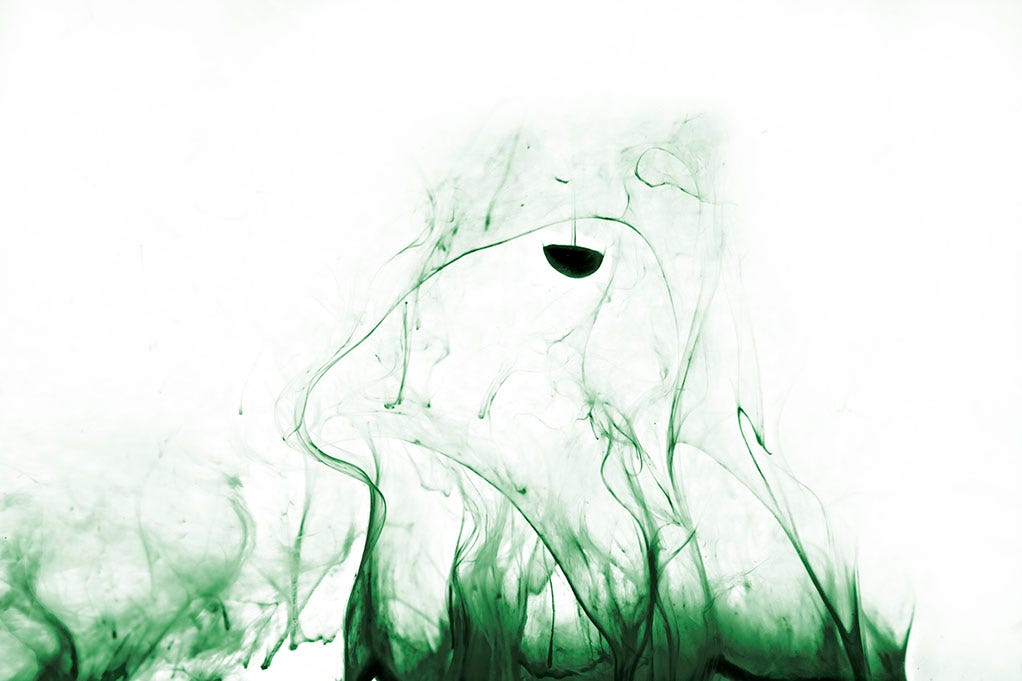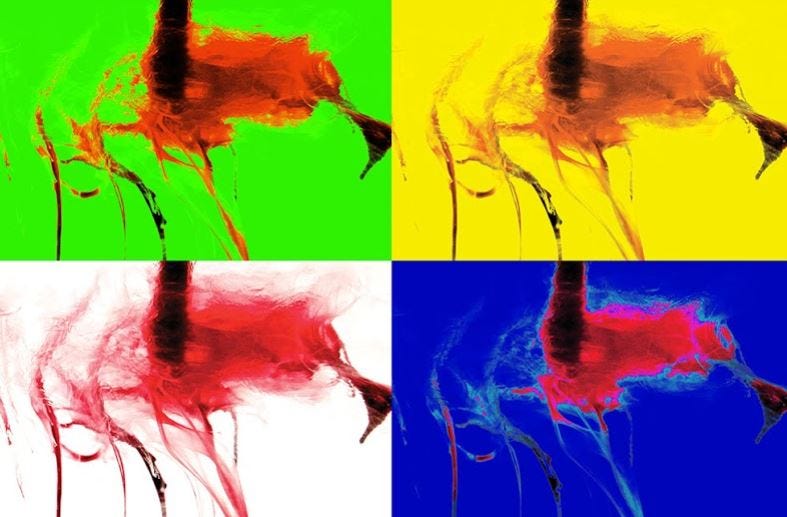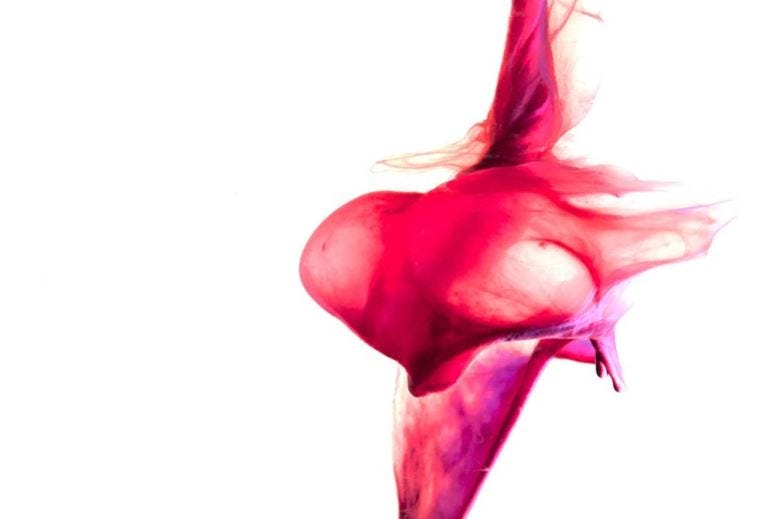
Sometimes, a moment of revulsion is actually pure revelation.
I recently broke up with my boyfriend — we had almost made it a year. And to make matters worse, I had harbored feverish notions that he was perhaps “my person,” or at least one of 25 on this earth who I had actually managed to find.
But alas.
On paper, his self-presentation was classic upper-middle-class whiteboy: long and tall. Short brown hair. Blue jeans, white T-shirts, and only marginally cool sneakers. He played Chopin on the piano and worked in solar sales. He had one tattoo of a lobster that was semi-kitschy, but beautifully inked. (You could see the minuscule hairs on its tail.) He was friendly and outgoing — if neurotic and selfish — and his big laugh barking out between big white teeth was something to behold.
Before I met him and we took off one another’s trousers to do the most fun thing on earth together, I had thought myself something of a “hangup-less” human. I prided myself on being all about the human body. I liked all the damp nooks and crannies. I liked chipped, crooked teeth and dirty calloused feet. I liked wrinkles and moles and renegade hairs. I liked being naked. I liked seeing other people naked. I wanted everyone to just get over it and get on with it! (Even as I also realized that being a skinny — if smelly — white girl offered me a societal baseline of self-love security.)
And in addition to him loving sex like a doberman loves steak, he also proved to be the least hung-up human on bodies that I’ve ever met. He put my tra-la-la-ness to damn shame.
But amid delectable foreplay vagaries that were jarringly intimate — namely armpit and rump nuzzling (how wonderful to have someone kiss all your shadowy bits) — I was still brushing up against a hang-up that in truth, I didn’t even know I was harboring.
Period sex. Or really, just my period.


“And if a man shall lie with a woman having her sickness, and shall uncover her nakedness; he hath discovered her fountain, and she hath uncovered the fountain of her blood: and both of them shall be cut off from among their people.” — Leviticus 20:18, Saint James Bible
“They question thee (O Muhammad) concerning menstruation. Say: It is an illness, so let women alone at such times and go not in unto them till they are cleansed. And when they have purified themselves, then go in unto them as Allah hath enjoined upon you. Truly Allah loveth those who turn unto Him, and loveth those who have a care for cleanness.” — 222nd verse of Chapter 2 of the Qur’an, translated by Marmaduke Pickthall
I think it’s difficult — even if you are a born and bred atheist like myself — to negate what seems to be the archetypal shame of menstruation, an instinctual aversion to the coupling of blood and sex.
And it’s not just religious folks, either.
The medicalization of menstruation — the notion that there is something wrong during menses that must be corrected — is a ubiquitous phenomenon that rears its bloodied visage in all kinds of applications.
Just look to the $2 billion annual industry of feminine hygiene products, only a portion of which involves pads or tampons. The rest is comprised of vaginal douches, washes, and wipes — aimed at restoring our precarious femininity and desire — which in turn, because they’re considered “cosmetic,” don’t have to be regulated by the FDA.
Meanwhile, the PMS pill Midol — which reminds you that “your menstrual cycle is just as unique as you are” — boasts four different varieties, repackaged versions of a trusty combination of acetaminophens (pain relievers) caffeine, and pyrilamine maleate (antihistamine).
Hate to get all feminist on your ass, but the commodification, medicalization, and systematic stigmatizing of menstruation is realer than real. And while we are finally talking about shifting the period paradigm — huge publications like The Atlantic and Forbes have recently tackled the psycho-socio-economical dissonance of our relationship to periods — it’s remained just that, talk.
The commodification, medicalization, and systematic stigmatizing of menstruation is realer than real. Click To TweetArtists and activists have been granted — nay taken — a newfound spot in our menstruation maelstrom as well. Photographer and poet Rupi Kaur made a huge splash when Instagram deleted her period photos according to their nebulous and arguably misogynistic “community standards,” while runner Kiran Ghandi — who recently ran the London marathon sans tampon — surfaced a whole other can of worms in her open support of “those sisters without access to tampons.”
Indeed, the United Nations has declared menstrual hygiene a public health and human rights issue. Yet the taboo surrounding periods throughout the world is so palpable that many women refuse to even acknowledge it or advocate on their own behalf, rendering them highly vulnerable, especially in countries like India where a dearth of water, sanitation, and hygiene is par for the course.
And so, here we are. Still.
The prevailing notion — across countries and cultures — that menstruation is an aberration, a chronic ailment, perpetuates dangerous tropes that the bodies of women and all those who menstruate are not only weak, but a living breathing vessel of betrayal. Every month our shame lies in wait.


The sex is wetter than wet; my insides are all over him. I’m matted in his pubic hair; I’m spread slick and crimson all over his stomach. I can see the almost-black edges of my blood in his cuticles. There are pink handprints on my back and splotches on my neck.
I liked the way the blood traced every place we touched one another, getting almost everywhere. I loved seeing his just-washed sheets still stained by me, and the streaks I’d sometimes get on my toes. I liked that we curled up and slept on the small faded brown pools, a nest all our own, a testament to bodies doing what they do.
And I think for me, this was at the crux of my joy. It wasn’t a kinky thing — it was just a, “this is what your body is doing right now” thing.
He’d kiss down my stomach and slowly part my legs. I’d feel him pause. I’d glance down and watch him with infinite affection as he carefully moved the tiny white thread two inches to the side before licking me. And then I’d say, “I want you” and then . . . he’d just pull out my tampon.
I don’t have to tell you that the first time he did this, it was intense in its humiliation. I was feigning total lustful indifference, but inside I was clapping my hands over my eyes in utter mortification. I had surely taken everything too far. The big G had certainly seen what I’d done and made a special place in hell for my perversion.
I’d glance down and watch him with infinite affection as he carefully moved the tiny white thread two inches to the side before licking me. Click To TweetThis is not sexy! my brain screamed. This is the antichrist, the antithetical moment to the very mystery we women-folk are told we need to ardently protect. I suddenly remembered my mother telling me she had never seen — nor heard — my father urinate until a decade into their marriage. He ran the sink-water when he used the bathroom.
There are things that are too intimate! There are things that belong in the shadows — avert your eyes and never make contact! Is nothing sacred? How can he ever gaze over at you in your little black dress and sigh, Ah, she’s always a woman to me, when he’s seen the sodden monstrosity that is a used tampon?
And so it went. Around and around on the self-loathing merry-go-round. All day ride, free pass.
Okay, yes, I’ve certainly had plenty of period sex — I’m not a monster for Christ’s sake! — but I also was made smaller in the process. I could feel the space between my shoulderblades collapse a bit to accommodate my body’s outward betrayal, to remind my lover I knew he was making a bit of a sacrifice. There were a slew of breathy I’m sorries and regretful smiles. And if the tampon had been forgotten on the floor post coitus and suddenly the light was thrown on . . . it was all I could do not to let out a Psycho-esque scream of terror.
This scenario does not intimacy make.
But in contrast to every other man I’d been with, he didn’t even mention it — he was SO blase about it, he may as well have been reaching for the damn salt shaker.
So for every woman who has coyly whispered, “I need to go to the bathroom” as you’re about it get it on, and then darted to the bathroom to frantically tug out a sodden piece of white cotton before darting back to bed and apologizing . . . I’m here to say this moment of revulsion was actually pure revelation.
Why the hell are we apologizing for what our body does — perfectly — anyway?


Perhaps it’s because blood in every other context (even childbirth if we’re honest) has been made synonymous with pain, with trauma.
And while I’ll be the first to admit that our uterus shedding its lining like a sloughing-off snake does make me pause, not gasp with desire, I also love its viscerality. I love its doggedness — every drip is a reminder of our fallible, but extraordinary, bodily selves. To me, it is a representation of all the many cycles and processes that we can never bear witness to — our neurology, our pathology, our intricate amalgam of hormones, our tendons and bones and tears and follicles and organs all working in not-perfect-but-damn-close-to-perfect synchronicity — so we can rise and fall every day.
And yet, even when we know these biological “truths” (there are few of us who actually believe period sex is dangerous or unhealthy or bad), we still cannot accept it. Bloody hands and vaginas and penises gives us the damn willies. It still makes us want to shirk and simper and apologize.
And while this is all sheer confabulation — we’re giving rational justifications to a seemingly instinctual emotional response — there are some compelling psycho-sexual elements that seem undeniable.
Simon de Beauvoir offers some salient insight in her renowned book The Second Sex:
“The young girl feels that her body is getting away from her, it is no longer the straightforward expression of her individuality; it becomes foreign to her; and at the same time she becomes for others a thing: on the street men follow her with their eyes and comment on her anatomy. She would like to be invisible; it frightens her to become flesh and to show her flesh.”
How true! How harrowing! In adolescence I feel as though we’re in a fleeting state of a not blissful, but civil, coexistence with our bodies. We may have found it too fat or freckled, but it was not yet the enemy. And then! The rebellion. It declares war — it bloodies our insides, our thighs and clothes and sheets and underwear and hands. It is no longer a peaceful kingdom.
And so too, as Beauvoir so keenly points out, do our bodies become imbued with projected desire. And with that proverbial gaze we become a kind of bifurcated creature. For surely we carry with us our former selves, but we stare down our clavicles, between our breasts, down our bellies and between our legs, and marvel at an entity that now has its own agency, its own ideas as to how things will go.
In that moment, we cross a painful precipice, and I think in truth, many of us still are still reeling from the passage.
But hey — at least we’re all able to revel in this twisted sisterhood of shared, perceived humiliation?


I know it sounds grotesque, but as time went on and he took out my tampon, it started to feel like the most natural thing in the world. It was no more of a hiccup in our lovemaking than tugging off our underwear or socks.
And then, more than that . . . I began to look forward to it.
He is the only person to have ever done THE ACT other than myself, and it became this tiny potent symbol of his love for me. In truth, it became one of those things that you like so much about someone else that you can’t ever tell them about it because they might become self-conscious and change it.
Do you have things like that? I have a catalogue of everyone’s most wonderful idiosyncratic behaviors and gestures, sounds and sayings, and I horde them in a beautiful cave in my heart, and I never let them know.
He does not know how lovely he looked, kneeling between my legs, the heady anticipation of knowing his body would soon replace a red tuft of cotton. He does not know he was able to strip away 32 years of shame all wrapped up in the ghostly visage of a dried bloody tampon.
But under our gaze, there it would sit on his bedside table — its string limp and lovely — quietly singing the unforgiving beautiful messiness of the body.

